Overseas Case:Istituto Fondazione di Oncologia Molecolare ETS (Italy)
Empowering a Robust Community of Researchers Across Disciplines: The IFOM Postdoc Association
IFOM ETS - The AIRC Institute of Molecular Oncology (in Italian: IFOM - Istituto Fondazione di Oncologia Molecolare ETS), is an Italian research institute that provides a robust environment for cancer research to international researchers.
For this article, we spoke to Ms. Mio Sumie, who is the student administrator at the PhD office at IFOM. Ms. Sumie also works as an Extraordinary Member for the former IFOM Postdoc Association (IPA), which is a community-led organization of postdoctoral researchers within the institute. The IPA focuses on the career development of researchers beyond the postdoctoral fellowship through soft skills courses, seminars, and peer-networking events.
The IPA also helps postdoctoral researchers at the institute develop a strong network of peers in allied fields, which is important for career development in any stream. The IPA is currently undergoing a reorganizational phase, and a new, unique network will soon be launched to support postdoctoral and PhD scholars.
Abstract
IFOM ETS - The AIRC Institute of Molecular Oncology (in Italian: IFOM - Istituto Fondazione di Oncologia Molecolare ETS), headquartered in Milan, Italy, is a research institution founded with the goal of understanding cancer biology. The institute not only provides a rich international atmosphere, but it also hosts state-of-the-art infrastructure. Although IFOM is primarily a research institute, it also hosts PhD students who work on various research projects through partnerships with four educational institutes.
The IFOM Postdoc Association (IPA) is a venture of the institute that works toward supporting postdoctoral scholars not only with their research but also with other aspects of their career and life. The IPA works toward researcher enrichment by organizing various events to provide opportunities for networking and learning. The focus of the IPA is on enhancing soft skills and exploring the myriad career options available beyond a postdoctoral fellowship.
Interviewee’s Bio
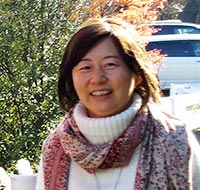
Ms. Mio Sumie is the student administrator at the PhD office at IFOM. She is also the extraordinary board member of the IFOM Postdoc Association (IPA) and takes care of IFOM international affairs related to Japan.
IFOM: A premier research institute
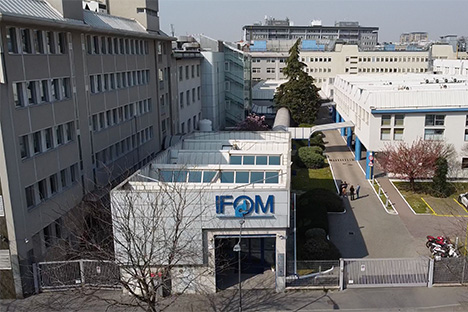
The headquarters of IFOM ETS in Italy
Image source: IFOM
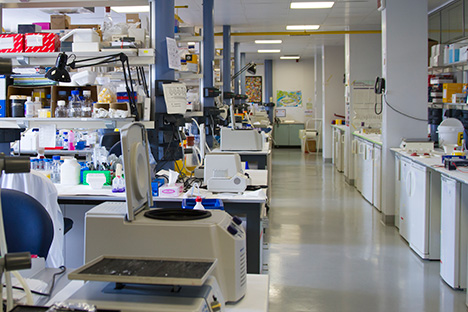
Research at IFOM; in addition to sophisticated equipment and infrastructure, highly qualified staff support researchers in the preparation and storage of solutions, antibiotics, cell culture, and sterilization of any lab material.
Image source: IFOM
IFOM ETS - The AIRC Institute of Molecular Oncology (in Italian: IFOM - Istituto Fondazione di Oncologia Molecolare ETS) was established as the first Italian research institute focused on tumor development and formation. Over the years, the institute has expanded to cultivate a thriving international environment, with 26.5% of the staff comprising individuals from different countries around the world. The rich research atmosphere of the institute is complemented by the plethora of collaborative research projects that are undertaken here, with an aim to promote interdisciplinary research facilitated by advanced technology and infrastructure.
Primarily a research institution, IFOM has collaborated with several academic institutions to establish a fully funded PhD program where scholars pursue a research project at IFOM while attending courses at the partner academic institutions. The four institutions include the European School of Molecular Medicine (SEMM) (Milan, Italy); The Open University (Milton Keynes, UK); the University of Galway (Galway, Ireland); and the Pázmány Péter Catholic University (Budapest, Hungary). IFOM is actively working on these partnerships and administrative collaborations to sustain a wider variety of PhD programs. While some of these programs are based on broad themes, some cater to a very specific niche of research interests.
Through a partnership with The Open University, students affiliated to IFOM can access the Vitae Research Development Framework (RDF), which is an insightful tool that helps them track their research progress and make informed decisions regarding the next step in their research journey within the PhD program. While limited to PhD students at The Open University, the possible expansion of this facility and extension to postdoctoral researchers is on the horizon.
The IFOM Postdoc Association (IPA): An overview
Beyond training PhD students, IFOM also hosts several postdoctoral researchers (postdocs). The IPA is an organization formed within IFOM that primarily works to provide networking opportunities among the community of researchers and is currently in the process of reinventing itself. Defining themselves as an association of all postdocs working at IFOM, the IPA strives to build a dynamic atmosphere for researchers and encourage socialization among the community. Currently, the IPA is undergoing organizational changes, and it may expand its ambit of activities and focus areas in the future.
The IPA emphasizes 4 main goals:
- Foster interactions between postdocs of different labs
- Organize soft skill courses
- Provide different perspectives on future careers, as an alternative to becoming a principal investigator (PI)
- Create a network with other postdoc associations all around the world
To help systematically achieve these goals, IPA used to constitute a Board that comprised a maximum of 10 volunteers who were elected annually by the entire postdoc community. Going forward, the administrative structure of the IPA body may be subject to change. Earlier, the Board was led by a President, a Vice President, and an Executive Council. The roles were shared equally among genders and council members were chosen to represent the diverse community of international researchers working at IFOM. With the organizational reform of the IPA, it is possible that the leadership structure may change. However, the tradition of a strong commitment toward inclusivity and diversity will continue to be upheld within the organization.
The IPA is also supported by Extraordinary Members who are nominated by the Scientific Director. The members provide vital support to the researcher community, helping with administrative tasks that the researchers are not used to dealing with. Ms. Sumie herself is one of the Extraordinary Members presently assisting the IPA.
The IPA organizes a number of events to help researchers connect, share, and learn. The Board meets on a monthly basis to plan and organize upcoming activities. The IPA works flexibly within the institutional budget, adapting to the requirements of researchers as well as the scope of events and activities to be organized each year. All expenses for IPA activities are pre-authorized by the institutional administration.
Peer engagement and networking: Activities and events by the IPA
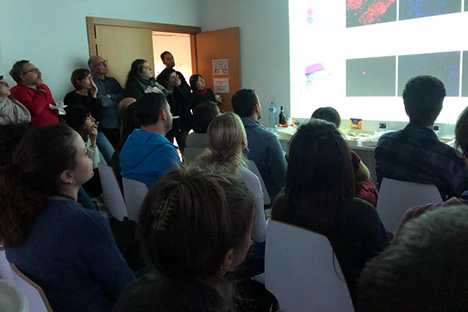
Dr. Cinzia Cancellieri delivers a talk on her work regarding human induced pluripotent stem cells. The IPA organizes several sessions where postdocs deliver short talks to their peers and discuss their research projects.
Image source: IPA
“The Postdoc Association is an essential organ to dynamically gather people of common interests within the postdoc/research life. It can be very useful in terms of education & networking, but also for creativity and motivation” reads a testimonial by Dr. Gema Malet Engra, a former member of the IPA Board.
The various events organized by the IPA center around fostering valuable connections with peers and learning from each other.
One of the popular events is Pizza Talk, wherein two postdocs are invited to present short talks, discussing their ongoing research projects or past work. The entire community is invited to participate in the discussion following the talks, explore links between their own research and that of the speakers, and socialize over pizza and drinks. The format of the event has been designed to maintain a casual ambience, such that new postdocs or PIs who have freshly joined the institute feel at ease.
While a vertical relationship may exist within research groups, with regular communication channels between the PIs, postdocs, senior PhDs students, and junior researchers of a particular lab, such events provide the community with a platform to expand their network horizontally as well. The ultimate goal is to help build meaningful collaborations through interaction between different research groups.
IPA activities for career development and exploring alternate career paths
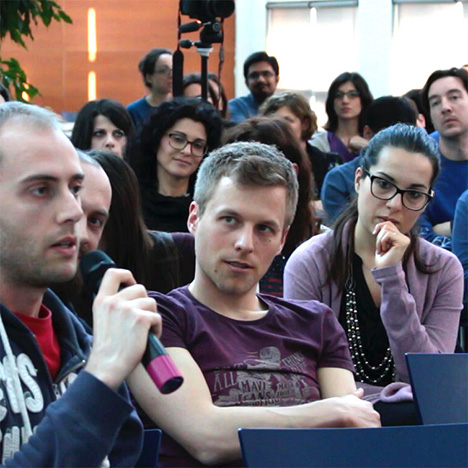
Scholars interacting with the speakers at a Science and Prosecco event.
Image source: IPA
Another event with a more formal format is Science and Prosecco, organized annually or biannually. Herein, the IPA works to set up interactive meetings with eminent researchers and notable personalities in international companies and prominent European organizations. The event helps senior researchers explore alternate career paths, highlighting how careers in the academic space or as a PI are not the only available options beyond a postdoctoral fellowship.
External speakers from diverse fields, such as science communicators, funding and grant managers, entrepreneurs, and industrialists, are invited for this event. This helps broaden the perspectives of the PhD students and postdocs regarding the career trajectories that are available to them. Sometimes, this event showcases the career trajectories of IPA alumni, who interact with the current cohort of scholars. This event is also used as a platform to introduce new PIs at IFOM.
Beyond these events, IPA Meets are also organized periodically. This is another networking initiative undertaken by the IPA, focused on providing postdocs meaningful interaction opportunities with leading scientists in academia and research. It involves seminars delivered by external speakers, including eminent researchers from related fields.
Optional courses for development of soft skills
One of the core aims of the IPA is to help postdocs develop soft skills that hold value beyond the ambit of research. The IPA emphasizes communication, writing, presentation, and management as valuable skills that postdocs can hone to have an edge in their professional careers. To this effect, the IPA organizes several optional courses for the postdocs, ranging from scientific communication and grant writing to digital presentations and patents. These courses are often open to even PhD students who benefit immensely from the skill development early in their research journey.
In order to cater to the specific needs and interests of the postdoctoral cohort, the IPA scouts for suggestions from among the scholars and often prepares a list of potential courses that can be organized. This helps tailor the courses offered to the cohort and maintain a dynamic environment for learning.
The IFOM, IPA, and opportunities for individuals from Japan

The IFOM welcome office provides 360° support to international scholars, and IFOM and the IPA have several programs for international students to promote an interest in research.
Image source: IFOM
The international associations that IFOM nurtures are multifaceted and focused on bringing together the shared experience and knowledge that individuals possess. IFOM also has several ties with Japanese universities, such as Kyoto University, Riken Yokohama, and the Institute of Quantitative Biology (IQB) at Tokyo University, where PhD students, Postdocs, and researchers from these institutes can visit and experience the labs and research conducted at IFOM for a short period. This is part of a bilateral visit agreement, where selected scholars from IFOM also get to explore and experience the research environment at the Japanese universities.
The invitation is also extended to undergraduate students and postdocs, who get to attend the various social events such as Science and Prosecco, interact with the resident scholars, and immerse themselves in the research environment at IFOM.
The cultural and social shift that people experience when opting for an international learning experience can be difficult to navigate for many. In order to assist international postdocs who move to Italy, the Welcome Office offers 360° support. It is entrusted with special responsibilities to help acclimatize international scholars as well as faculty to Italian culture.
Response from former IPA members
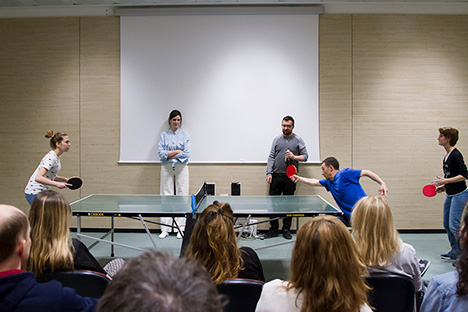
A table-tennis competition organized by the IPA; one of several activities to help researchers socialize, communicate, and get to know each other.
Image source: IPA
Since the inception of the IPA, many of its alumni have gone on to lead successful and fulfilling careers around the globe. The former members credit the various events and talks organized by the IPA for inspiring their creativity, motivating them, and expanding their skillsets beyond their chosen fields of research.
Talking about the establishment of the IPA, Ms. Sumie mentions that while there was some skepticism and hesitation at the beginning, the researchers eventually realized the importance of having a forum where their voice could be heard and collaborated to form a space where they could better interact with peers outside laboratories. Establishment of organizations like the IPA may not happen overnight. The IPA itself was formed after two years of discussion! However, the resulting community that has grown is indispensable and has become an important pillar for researchers at IFOM.
Moreover, some members mention how planning and organizing the IPA activities also gave them first-hand experience in event organization, conducting courses, and project management. “During the time I spent in IPA, I've been able to expand my skillset, since I've been involved in scientific and social events organization, scientific courses, project management. These have been very educational activities, since I have had the opportunity to enrich and expand my professional background,” reads a testimonial by Dr. Umberto Restuccia, a former President of the IPA.
Advice for young researchers interested in the IPA
Ms. Sumie advises future applicants to “think out loud” and “keep asking relevant questions.” As a collective of researchers at a leading research institute, the IPA offers a dynamic environment to hone one’s skills and explore careers in academia and beyond. Having an open-minded attitude and exploring new developments across one’s topics of interest, with a passion to discuss them with peers, will definitely help interested individuals display the enthusiasm needed to make the most out of the plethora of opportunities offered by IFOM and the IPA.
IFOM Corporate Profile
IFOM, the AIRC Institute of Molecular Oncology, is an Italian highly technological, non-profit research center supported by AIRC, the Italian Association for Cancer Research. Research conducted at IFOM aims to understand the molecular processes responsible for the onset and development of cancer.
To meet the demands of modern-day science, IFOM created a research environment where scientists from the major national scientific institutions in the Milan area could collaborate and pool their organizational, economic and cultural resources. The creation of a research institute “network” was the first of its kind in Italy and has resulted in IFOM being an internationally competitive research center in molecular oncology and functional genomics.
IFOM has been recognized as a Centre of Excellence for Research by the Lombardy Regional Council, which also contributed to IFOM’s development.
Having established a solid base in basic research, IFOM is now concentrating its efforts on translational research for the rapid transfer of scientific findings from the laboratory to diagnostic and therapeutic clinical practice. IFOM has adopted a strong international approach, fostering partnerships with world-class research institutes in Japan and India. Thanks to these agreements, IFOM is becoming an important player in the global landscape of cancer research institutions.
Interview date: December 2022
Interview cooperation: Cactus Communications
